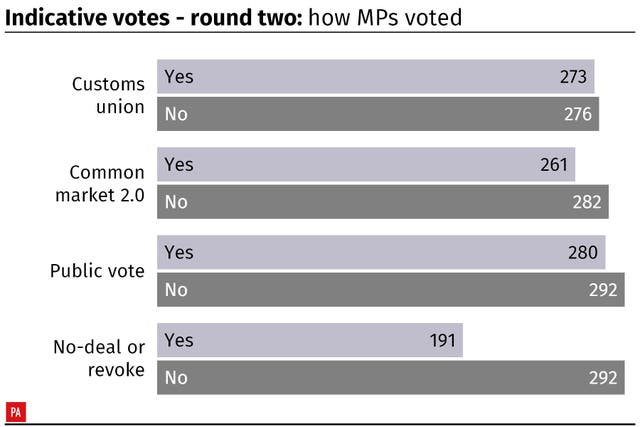May gathers Cabinet as Barnier says no deal more likely by the day
The marathon meeting of ministers is aimed at ending the Brexit deadlock.

Theresa May is holding an extended Cabinet session to try and break the Brexit deadlock, as EU chief negotiator Michel Barnier said a no-deal withdrawal was becoming more likely by the day.
The Prime Minister is gathering her top team for crisis talks in Downing Street after MPs again failed to find a majority for a series of alternatives to her Brexit deal.
The meeting comes after the UK’s highest ranking civil servant wrote to ministers warning of food price hikes and security threats if Britain leaves the European Union without a deal.
And former Conservative leader William Hague warned that any successor to Mrs May could find the party in ruins as a result of Brexit.
MPs rejected a call for a customs union with the EU by just three votes on Monday, while a demand for a second referendum was defeated by 12 and a “Common Market 2.0” deal by 21.

Mr Barnier said the UK now had two options, quit the EU without a deal, or seek an extension to Article 50.
Speaking in Brussels, Mr Barnier said: “If the UK Parliament does not vote in favour of the Withdrawal Agreement in the coming days only two options would remain.
“Leaving without an agreement or requesting a longer extension of the Article 50 period.”
Mr Barnier said a no-deal Brexit was “never our desired or intended scenario” but “becomes day after day more likely”.
He added: “The UK may ask for another extension. Such an extension would carry significant risks for the EU. Therefore a strong justification would be needed.
“We have always said that we can accept a customs union, or relationship along the style of the Norway model. The Political Declaration today can accommodate all of these options already.
“But if the UK so wishes we are ready to rework the Political Declaration.”
Mr Barnier later told the European Parliament’s Committee on Foreign Affairs that no-deal would disrupt EU/UK security co-operation.
“We need to be aware of the implications of a no-deal for our security partnership,” he told MEPs.
“There will be a break in the level of talks, less mutual commitment, risks to intelligence pooling. There might be inconsistencies in applying sanctions regimes because of a low level of co-operation.
“The UK would no longer be taking part in EU operations or in the European Defence Agency’s capacity-building programmes.”
Mr Barnier said: “No-deal for some time poses the threat of there being no organised framework… Come what may, we must fend off the risk of strategic divergence.”

In his letter to ministers, obtained by the Daily Mail, Cabinet Secretary and National Security Adviser Sir Mark Sedwill warned of likely consequences of a no-deal Brexit, including:
– A UK-only recession, meaning that the expected fall in the value of the pound will be “more harmful” than during the 2008 global crisis;
– A 10% spike in food prices;
– The collapse of some businesses that trade with the EU, with pressure on Government to bail companies out;
– Disruption to national security and reduced law and order capabilities;
– Reintroduction of direct rule in Northern Ireland for the first time since 2007.
Tuesday’s extended Cabinet was opening with a “political” session in the absence of civil servants, fuelling speculation the senior Tories could use the time to consider a snap election, the timing of the Prime Minister’s exit from office or to air the bitter grievances between the Leave and Remain wings of the ministerial team.
Lord Hague warned that an early election could leave the Tories in a far worse condition than in 1997, when he inherited the leadership after Tony Blair’s landslide victory had reduced the party to a rump of 165 MPs.

Writing in the Daily Telegraph, the Tory peer said: “The internal situation in the Conservative Party is much worse than it was in 1997.
“The ruin I moved in to as the new leader was, at least, intact. We had many differences, but we resolved them without talk of leaving altogether, opposing our own party on a vote of confidence, or deselecting tranches of MPs. We all joined together in the long task of rebuilding.
“By contrast, some of today’s leadership candidates may find themselves sitting in a small ruin on their own.”
The failure of any option to gain a majority in the Commons on Monday left the UK no clearer about its direction with the prospect of a no-deal Brexit on April 12.
Brexit Secretary Stephen Barclay told MPs that if they wanted to secure a further delay from the European Union, the Government must be able to put forward a “credible proposition” as to what it would do.
But he held out the prospect of leaving with a deal next month – as long as MPs back one.He said: “If the House were to agree a deal this week, it may still be possible to avoid holding European Parliamentary elections.”

Secretary of State for Health and Social Care Matt Hancock pleaded with MPs to back the Prime Minister’s deal “and deliver Brexit”.
But European Parliament Brexit coordinator Guy Verhofstadt said the votes meant “a hard Brexit becomes nearly inevitable”.
He suggested that Wednesday, when MPs may have a third attempt at reaching a majority, was the “last chance to break the deadlock or face the abyss”.
Labour chairman of the Commons Brexit Committee Hilary Benn said that if the PM did not announce she was seeking an Article 50 extension, MPs could try to force her to on Wednesday.
Referring to an extension request, he told the BBC: “If she does not do so then there is an option available to the House of Commons to seek to legislate to require the Prime Minister to do that.”





